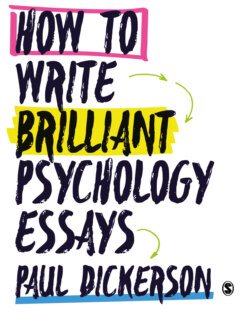Читать книгу How to Write Brilliant Psychology Essays - Paul Dickerson - Страница 22
На сайте Литреса книга снята с продажи.
How can I get started?
ОглавлениеTurn it from a chore to something playful. Just play with the ideas. Here are some ideas that might help you to find your own playful engagement in starting to write your essay:
What are the relevant names or ideas? Do little speech bubbles for them, what might they say?
What if they were all at a party together – what would they wind up saying?
Find a supportive environment. Do you work best when others are around you, or perhaps with the background sounds of a café, or the focused concentration of quiet sections of a library?
Perhaps some sort of background music or ambient sounds work for you, but be realistic about what is genuinely helpful, and don’t spend ages trying to find the perfect acoustic accompaniment.
Think about the times of the day when you are most productive and try to make use of them – perhaps ‘chunking’ your time into manageable units with short breaks in between.
When the situation is less than perfect, as it so often is, don’t tell yourself you can’t – show yourself that you can work even in tricky circumstances – this is your Mount Everest that you are climbing.
Can you draw something that expresses the ideas or how they relate together?
Can you create a two-minute summary? Perhaps a small podcast of what you know about the topic? This could include some of the things you want to find out, though don’t use this to get out of documenting those things that you do know.
Ace your assignment Try these practical fixes for procrastination problems
Work separately from your phoneWhen were you last looking at your phone? If you are like me and find that the phone can be quite a distraction then just ask yourself, who’s the boss you or the phone? Your phone won’t take it personally if you switch it off, turn it face down or put it (safely) in another room. Afterwards, your phone and you can enjoy a happy reunion.
Choosing a targetSome writers work to a specific word length (for example, completing a certain number of words per day), others for a scheduled amount of time (for example between 8pm and 11pm). These options are discussed later in this chapter, but see what you find most encouraging and motivating for the essay writing tasks that you need to complete right now.
If it’s flowing keep goingDo you know that feeling when your writing is going well? It is wonderful, it’s precious and it can be worth riding that wave for a while. Don’t let little distractions knock you off – keep with the energy.
If it’s not, keep goingI’m writing this sentence immediately after a phase when it was not flowing at all. Don’t get too ready with the narrative, ‘It’s gone rubbish today’ or, ‘I’ve been hopeless’. The real skill is to transform those times when it’s not flowing into something productive. It might mean changing the focus of our writing – but stay on task and be really encouraging to yourself. Getting back on track is a small miracle – well done you!
Leave it in a nice state to return toWhen you need to park your work – leave it so when you come back to it, it is really clear how to carry on with your writing. An easy guide to yourself on what you were working on and what feel you need to do would be great. Be kind to the ‘you’ of tomorrow who’s going to pick this stuff up.
Schedule facilitative breaksSome people find that working for short segments of time (perhaps 20, 30 or 60 minutes) punctuated with very short breaks (perhaps 5 minutes) works well. As long as this pattern does not break your flow of concentration, this ‘chunking’ approach can be a good way of keeping energy and motivation levels high. The idea of chunking (and Cirillo’s, 2018 Pomodoro Technique) is briefly touched on in Chapter 12.
